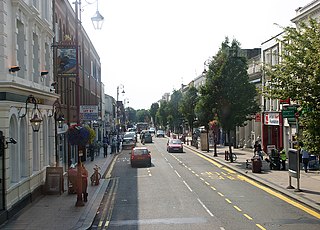
A narrow-gauge railway is a railway with a track gauge narrower than standard 1,435 mm. Most narrow-gauge railways are between 600 mm and 1,067 mm.

The South Tynedale Railway is a preserved, 2 ft narrow gauge heritage railway in Northern England and is England's highest narrow gauge railway. The 2 ft line runs from Alston in Cumbria, up the South Tyne Valley, via Gilderdale, Kirkhaugh and Lintley, across the South Tyne, Gilderdale and Whitley Viaducts to Slaggyford in Northumberland.
The War Department Light Railways were a system of narrow gauge trench railways run by the British War Department in World War I. Light railways made an important contribution to the Allied war effort in the First World War, and were used for the supply of ammunition and stores, the transport of troops and the evacuation of the wounded.

The North Ings Farm Museum is a working farm museum containing a 2 ft narrow gauge railway, running on a circuit of 1⁄4 mile (0.40 km). It is located at Dorrington, between Lincoln and Sleaford, in Lincolnshire. The museum includes agricultural machinery and tractors, commercial vehicles, portable steam pumps and a fairground organ.

The Bala Lake Railway is a narrow-gauge railway along the southern shore of Bala Lake in Gwynedd, North Wales. The line, which is 4 1⁄2 miles (7.2 km) long, is built on a section of the former standard-gauge Ruabon–Barmouth GWR route that closed in 1965. Another section of the former permanent way is used by the Llangollen Railway. The Bala Lake Railway, which runs on 2 ft -gauge preserved rolling stock, is a member of the Great Little Trains of Wales.
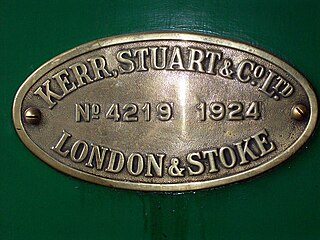
Kerr, Stuart and Company Ltd was a locomotive manufacturer from Stoke-on-Trent, England.
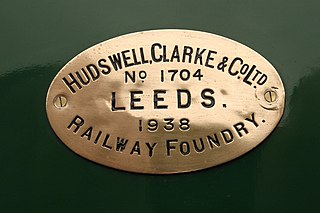
Hudswell, Clarke and Company Limited was an engineering and locomotive building company in Jack Lane, Hunslet, Leeds, West Yorkshire, England.

There were more than a thousand British narrow-gauge railways ranging from large, historically significant common carriers to small, short-lived industrial railways. Many notable events in British railway history happened on narrow-gauge railways including the first use of steam locomotives, the first public railway and the first preserved railway.

Yaxham Light Railway is a 2 ft narrow gauge light railway situated adjacent to Yaxham railway station on the Mid-Norfolk Railway. It is located in the village of Yaxham in the English county of Norfolk.
British industrial narrow-gauge railways are narrow-gauge railways in the United Kingdom and the Isle of Man that were primarily built to serve one or more industries. Some offered passenger services for employees or workmen, but they did not run public passenger trains. They are categorized by the primary industry they served.

The Sand Hutton Light Railway was a minimum gauge estate railway serving the estate of Sir Robert Walker, the Fourth Baronet of Sand Hutton, Yorkshire. It connected the main house with the LNER Warthill Station and the village of Bossall. It replaced the earlier, shorter, 15 in gauge Sand Hutton Miniature Railway that was built in 1914.

The Dinorwic Slate Quarry is a large former slate quarry, now home to the Welsh National Slate Museum, located between the villages of Llanberis and Dinorwig in North Wales. It was the second largest slate quarry in Wales, indeed in the world, after the neighbouring Penrhyn Quarry near Bethesda.
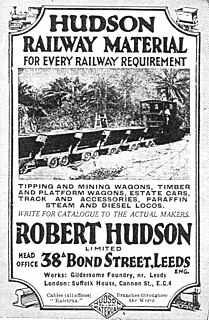
Robert Hudson Ltd was a major international supplier of light railway materials, based in Gildersome, near Leeds, England. The name was later changed to Robert Hudson (Raletrux) Ltd.
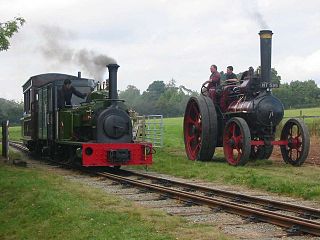
The Statfold Barn Railway is a narrow gauge railway of 2 ft gauge near Tamworth, Staffordshire and partially in Warwickshire, England, also displaying locomotives of other gauges including 4 ft 8 1⁄2 instandard gauge, 18 in and 2 ft 6 in, and other vehicles. It is privately owned by Mr Graham Lee, former chairman of LH Group Services Ltd – which in 2005 bought what remained of the Hunslet Engine Company.

Under the Whyte notation for the classification of steam locomotives by wheel arrangement, 2-6-2+2-6-2 is an articulated locomotive using a pair of 2-6-2 power units back to back, with the boiler and cab suspended between them. The 2-6-2 wheel arrangement has a single pair of leading wheels in a leading truck, followed by three coupled pairs of driving wheels and a pair of trailing wheels in a trailing truck. Since the 2-6-2 type was often called the Prairie type, the corresponding Garratt and Modified Fairlie types were usually known as a Double Prairie.

The Penrhyn Main Line class was a class of three narrow gauge steam locomotives built for the Penrhyn Quarry Railway (PQR). These locomotives were built by the Hunslet Engine Company between 1882 and 1893 and supplied specifically to work the railway that connected the Penrhyn Quarry near Bethesda in north Wales to Port Penrhyn on the Menai Strait.
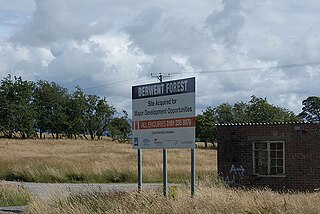
RNAD Broughton Moor is a decommissioned Royal Naval Armaments Depot located between Great Broughton and Broughton Moor in the County of Cumbria, England.
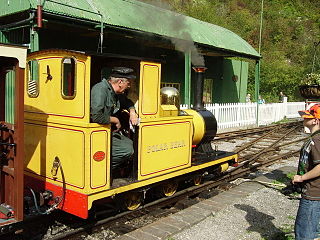
The Amberley Museum and Heritage Centre Railway is a 2 ft narrow gauge railway based at the Amberley Museum & Heritage Centre, Amberley, West Sussex. It has a varied collection of engines and rolling stock ranging from 18 in gauge to 5 ft 3 in gauge. It operates passenger trains at the museum using a mixture of steam, internal combustion and battery-electric locomotives.

The Old Kiln Light Railway is a 2 ft narrow gauge railway located at the Rural Life Centre open-air museum in Tilford, near Farnham, Surrey. It has a collection of historic locomotives and rolling stock including two steam locomotives. It operates on Sundays and some Bank Holidays during the summer season.


